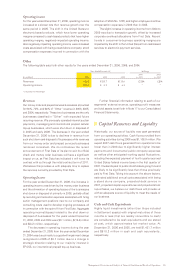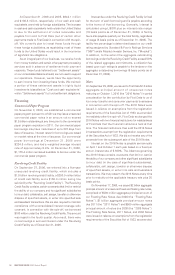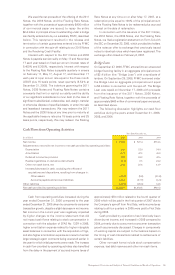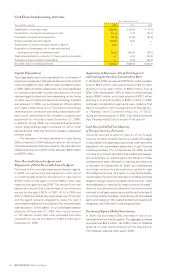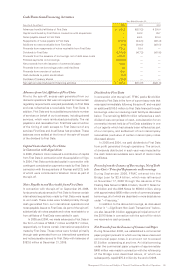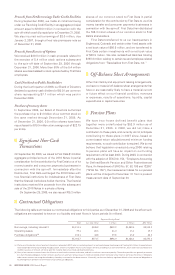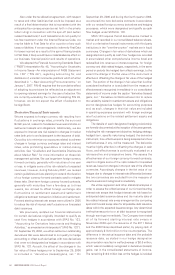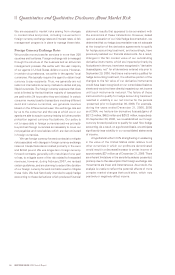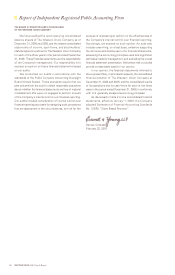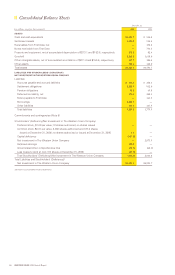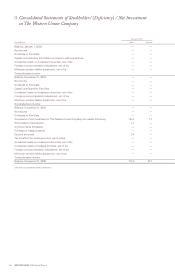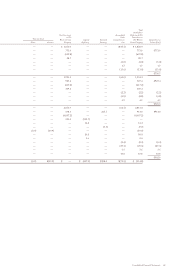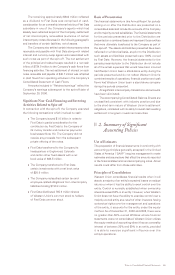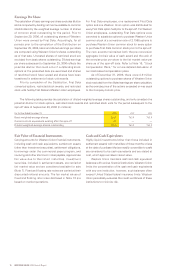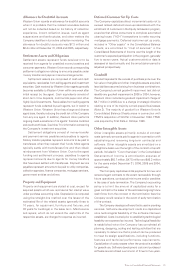Western Union 2006 Annual Report Download - page 63
Download and view the complete annual report
Please find page 63 of the 2006 Western Union annual report below. You can navigate through the pages in the report by either clicking on the pages listed below, or by using the keyword search tool below to find specific information within the annual report.61
Interest Rates
A portion of our investments are fixed rate interest-bearing
securities, which may include investments made from
cash received from our money transfer business and other
related payment services awaiting redemption. We have
classified these investments as available-for-sale within
settlement assets in the consolidated balance sheets, and
accordingly, record these instruments at their fair market
value with the net unrealized gains and losses, net of the
applicable deferred income tax effect, being added to or
deducted from our total stockholders’ deficiency on our
consolidated balance sheets. As interest rates rise, the fair
market value of these securities will decrease; conversely,
a decrease to interest rates would result in an increase to
the fair market values of the securities.
Currently, the majority of our investments are
floating interest rate investments. Interest income on these
investments will increase and decrease with changes
in the underlying short term interest rates.
As of December 31, 2006, $500 million of our total
$3.3 billion in debt is based on floating interest rates. We
revised certain guidelines in February 2007 and are planning,
through the use of hedges, to increase the percent of
floating rate debt in the future, subject to market conditions.
The interest rate on our floating debt is based on LIBOR
plus 15 basis points and is reset on a quarterly basis.
Additionally, as of December 31, 2006, $324.6 million of
our $3.3 billion in borrowings represented commercial
paper with a weighted average interest rate of approximately
5.4% and a weighted-average initial term of 17 days.
Considering the interest rates associated with our fixed
and floating rate debt, as well as the interest rates on our
commercial paper, our weighted average interest rate on
our borrowings outstanding at December 31, 2006 was
approximately 5.7%.
A hypothetical uniform 10% increase in interest rates
would result in a decrease to pretax income of approximately
$4 million annually based on floating rate borrowings that
existed on December 31, 2006. The same 10% increase
in interest rates, if applied to current yields on our cash
and investment balances at December 31, 2006, would
result in an offsetting benefit to pre-tax income of $6 million
annually. There are inherent limitations in the sensitivity
analysis presented, primarily due to the assumption that
interest rate changes would be instantaneous. As a result,
the analysis is unable to reflect the potential effects of
more complex market changes that could arise, which may
positively or negatively affect income. In addition the current
mix of fixed versus floating rate debt and investments and
the level of assets and liabilities will change over time.
Regulatory
Our international agents have the responsibility to maintain
all licenses necessary to provide money transfer services
in their countries and to comply with all local rules,
regulations and licensing requirements. Our money transfer
business is subject to some form of regulation in each of
the 200 countries and territories in which such services
are offered. In some countries, only fully licensed banks
and the national post office are permitted to provide cross-
border money transfer service to the general public.
State, federal and foreign jurisdictions may impose
regulations that could impact our foreign exchange risk by,
among other possibilities, imposing regulations that limit
our ability to obtain the benefit of the exchange rate spread
between wholesale and retail currency rates or imposing
banking moratoriums or other actions that could affect
currency liquidity. We have successfully managed the
risks outlined above in the past and believe that the breadth
and scope of our network makes it unlikely that these risks
will have a material adverse impact on our business.
In those few countries with significant foreign currency
controls, we offer “inbound only” service and do not accept
funds in these countries for remittance abroad. Banking
moratoriums have been very rare and, to date, they have
not had an appreciable impact on our business. When
such a moratorium is imposed by a country, we may
temporarily discontinue its services in that country.
Quantitative and Qualitative Disclosures About Market Risk


